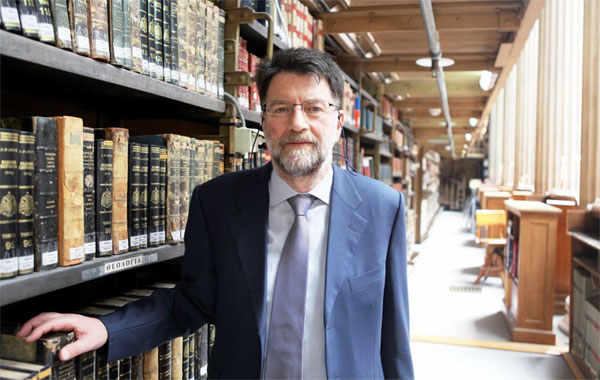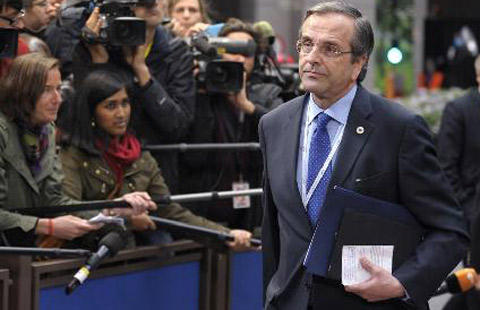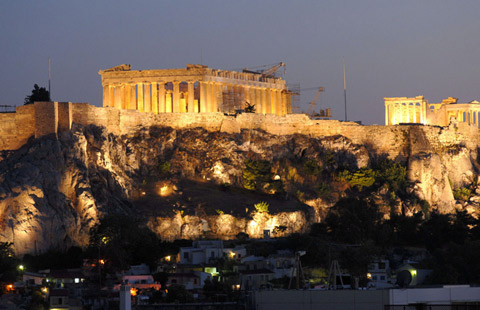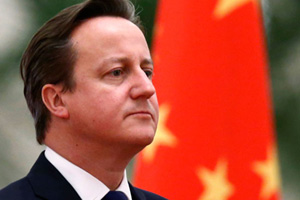
Greek library head promotes cultural connection to China
Comments Print Mail Large Medium Small
|
Filippos Tsimpoglou, general director of National Library of Greece. Fu Jing / China Daily |
Visit of premier and wife draws two ancient civilizations closer, Tsimpoglou says
As one who is used to preserving the records of an ancient civilization, veteran Greek librarian Filippos Tsimpoglou is well aware of the weightiness of the visit of a top representative of another long-standing civilization - China.
At the same time, Tsimpoglou, 57, general director of the National Library of Greece in Athens, says he's delighted at the visit to his homeland of Chinese Premier Li Keqiang from June 19 to 21. Tsimpoglou says he is sure the visit will bring the "two civilizations" closer.
It also is an honor, he says, to welcome the premier's wife, Cheng Hong, a professor in English literature in Beijing, at his magnificent building, which was built in 1832 and holds many different documents on Greek civilizations in many languages.
"It is a great honor for us to receive such a special guest, who is sending a message that China is showing respect to Greek and European civilization," says the librarian in his office, with shelves of Greek classics covering the walls.
Tsimpoglou says that in the spirit of cultural exchange, he came up with some reading recommendations for Li and Cheng, but they may seem tad unconventional coming from a guardian of Greece's venerable culture.
"I thought they have read Greek classics, and so I recommended that they read more about modern masterpieces in Greece," he says.
During an interview with China Daily prior to the visit, Tsimpoglou says he listed the collection of renowned modern Greek poet Constantine P. Cavafy (1863-1933), who drew his themes from personal experience and a deep and wide knowledge of history, especially of the Hellenistic era.
"The poet was always using his own life experiences to express internal struggle, fate and dilemma, and that is what I want to recommend to the couple," says Tsimpoglou.
He also recommended the works of Greek writer, poet and philosopher Nikos Kazantzakis (1883-1957).
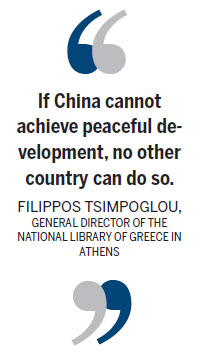
Tsimpoglou says he thinks that one of Greek civilization's big contributions is that it has enriched global expression by lending words to other cultures, including such widely used words as "logic, dilemma, economy, ecology and crisis."
Tsimpoglou says while he has had no chance to visit China, he hopes to do so. He says he respects China's civilization, which goes back for millennia, and which for him represents the accomplishments made possible by the "effort and energy" of humans.
"In this way, our civilization is just an infant before China's long history," he says.
The visit of the Chinese premier and his wife, he says, is a chance to observe China's culture and civilization.
When Cheng visits, he says he would propose an exchange of classics in each other's language. He says he would like to use his Chinese classics in Greek to exchange with Greek literary treasures in Chinese found in China.
"We have some Greek classics in Chinese but we need to add more to our library," he says.
Tsimpoglou has had a long career in library science. Before taking his new position nearly two months ago, Tsimpoglou worked at the Greek National Documentation Centre, which preserves research papers and other documents, for 16 years before he served as library director at Cyprus University for 14 years.
He says he likes to broaden his perspectives. His hobbies are traveling and taking photos. "In this way, you can live again what you have lived when you carefully look at your photos."
Tsimpoglou says he is a little concerned about the economic crisis that Greece is passing through, but he strongly believes in the future of Greece, as "both the geographical and cultural" door to Europe, and as a place that produced philosophers and thinkers who gave rise to Western civilization.
"So if somebody wants to approach European civilization, culture, mentality or people as a whole, he or she has to turn to the ancient Greek philosophers," he says.
Tsimpoglou uses his building as a metaphor for his country. The library, which he calls a mirror of Greek thought, was partly destroyed by a powerful earthquake in September 1999.
Pointing at the corner and ceiling of his office, he says the authorities had just stabilized it by filling the cracks with concrete.
"This is very much like the situation in Greece," says Tsimpoglou.
He explains that Greece flourished for years with borrowed money, spent in part on what he calls excessive public welfare schemes, that ended when the nation's debt crisis arrived several years ago like an earthquake.
"Then we put our efforts toward stabilizing things, not repairing or rebuilding the system and structure," he says. "We still live in a dangerous system that needs fundamental changes. Greece is like our library, we must confess."
He adds that while a growing number of people are keen to turn to reading and knowledge to empower them to find jobs, governments from the United States to Greece to the rest of Europe have cut spending on public libraries. But Greeks, he says, need to turn to his country's civilization to find a recipe to overcome the crisis and to help them show courage for change and reform.
"This is our hope and this is also our projection for the future," he says.
He says Greece faces not only difficulty but also a dilemma, which is a Greek word Tsimpoglou often uses. "How we maintain our civilization while changing is one of our current dilemmas," he says.
Greeks have not only suffered from the economic crisis but also a crisis of values, and the country needs to understand the job it faces and its obligations as well as contributing to the planet.
And Greeks, he says, should take action to determine their fate in order to improve their own lives, just as shown in ancient Greek thought.
"I am quite optimistic about the future of Greece. As a human being, we have to be," he says. "Otherwise, we would have stayed in caves. We will pass the crisis though I don't know if it will be in two or three years or in five years."
He suggests that Greeks need to be more self-disciplined and observe the law.
As for Europe, one of its missions is to help keep the peace, given that the continent suffered grievously from two world wars during the past century. "This is the challenge that Europe must face," he says.
Despite growing tension in the East China Sea and South China Sea, Tsimpoglou says he feels extremely confident that China will develop in a peaceful way. "China can succeed in a way different from previous global powers, which have claimed their positions through wars," says Tsimpoglou.
"China is a different country with a long history of civilization, a big population and the resources to make something different in history."
He adds, "If China cannot achieve peaceful development, no other country can do so."
(China Daily European Weekly?06/20/2014 page8)
